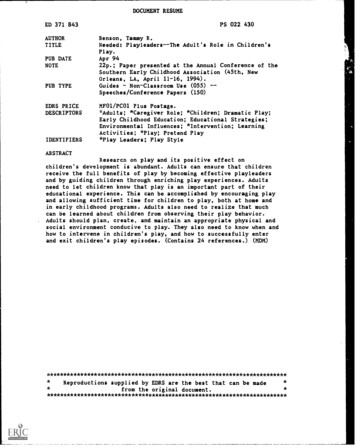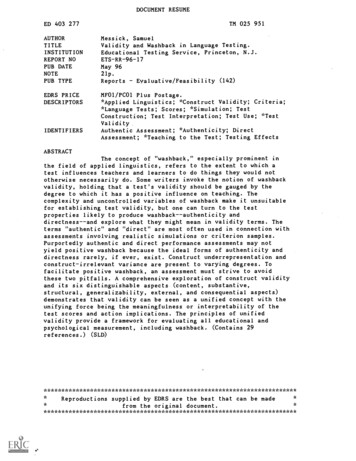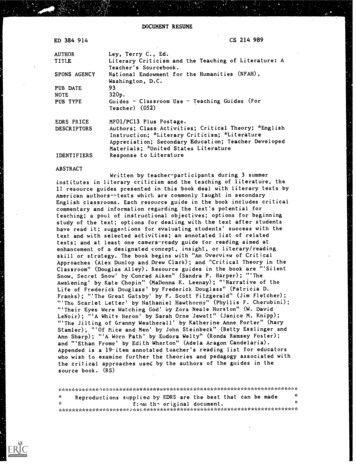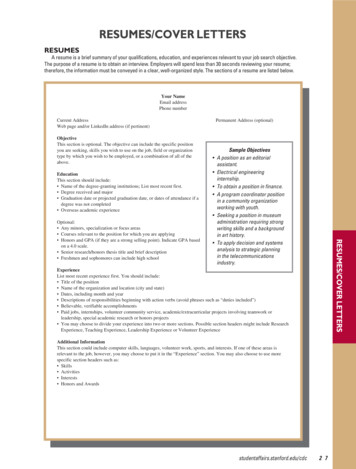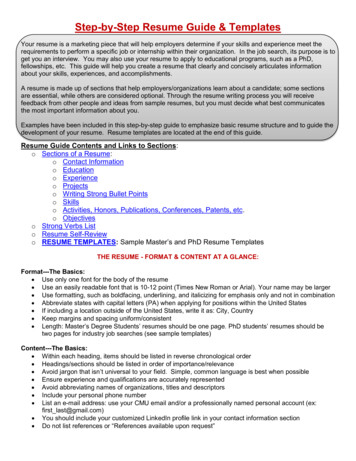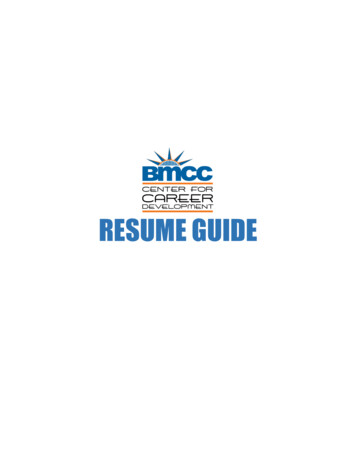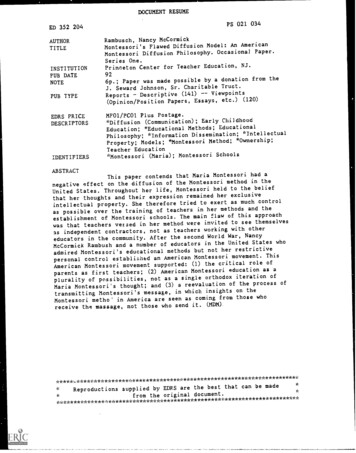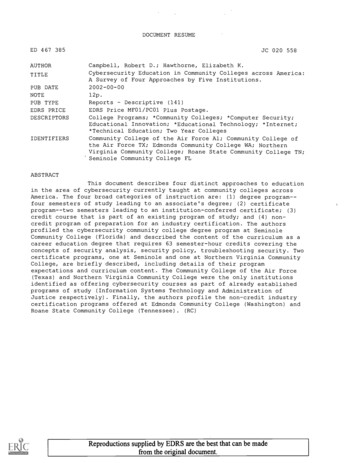
Transcription
DOCUMENT RESUMEED 467 385AUTHORTITLEPUB DATENOTEPUB TYPEEDRS PRICEDESCRIPTORSIDENTIFIERSJC 020 558Campbell, Robert D.; Hawthorne, Elizabeth K.Cybersecurity Education in Community Colleges across America:A Survey of Four Approaches by Five Institutions.2002-00-0012p.ReportsDescriptive (141)EDRS Price MF01/PC01 Plus Postage.College Programs; *Community Colleges; *Computer Security;Educational Innovation; *Educational Technology; *Internet;*Technical Education; Two Year CollegesCommunity College of the Air Force Al; Community College ofthe Air Force TX; Edmonds Community College WA; NorthernVirginia Community College; Roane State Community College TN;Seminole Community College FLABSTRACTThis document describes four distinct approaches to educationin the area of cybersecurity currently taught at community colleges acrossAmerica. The four broad categories of instruction are: (1) degree programfour semesters of study leading to an associate's degree; (2) certificateprogram--two semesters leading to an institution-conferred certificate; (3)credit course that is part of an existing program of study; and (4) noncredit program of preparation for an industry certification. The authorsprofiled the cybersecurity community college degree program at SeminoleCommunity College (Florida) and described the content of the curriculum as acareer education degree that requires 63 semester-hour credits covering theconcepts of security analysis, security policy, troubleshooting security. Twocertificate programs, one at Seminole and one at Northern Virginia CommunityCollege, are briefly described, including details of their programexpectations and curriculum content. The Community College of the Air Force(Texas) and Northern Virginia Community College were the only institutionsidentified as offering cybersecurity courses as part of already establishedprograms of study (Information Systems Technology and Administration ofJustice respectively). Finally, the authors profile the non-credit industrycertification programs offered at Edmonds Community College (Washington) andRoane State Community College (Tennessee). (RC)Reproductions supplied by EDRS are the best that can be madefrom the original document.
Cybersecurity Education in Community Colleges Across America:A Survey of Four Approaches by Five InstitutionsU.S. DEPARTMENT OF EDUCATIONOffice of Educational Research and ImprovementRESOURCES INFORMATIONCENTER (ERIC)This document has been reproduced asreceived from the person or organizationoriginating it.Minor changes have been made toimprove reproduction quality.Points of view or opinions stated in thisdocument do not necessarily representofficial OERI position or policy.PERMISSION TO REPRODUCE ANDDISSEMINATE THIS MATERIAL HASBEEN GRANTED BYbyRobert D. Campbell (Rock Valley College)andElizabeth K. Hawthorne (Union County College)TO THE EDUCATIONAL RESOURCESINFORMATION CENTER (ERIC)1IntroductionSince September 11, 2001, Americans are more aware of threats to computer systemvulnerabilities and the urgent need to educate the workforce quickly and effectively.Education in "cybersecurity" and information assurance falls into two distinct categories.The first is training, marked by an emphasis on particular systems, situations, orenvironments rather than broad principles. The second is scholarly, marked by anemphasis on underlying principles, concepts, and their applications. Scholarly educationand training complement one another.This paper describes four distinct approaches to education in the area of cybersecuritycurrently being taught at community colleges across America. We define fourprototypical avenues for packaging the instruction, as are commonly found in the twoyear college environment, and describe the offerings at each institution. We will describethese instantiations in sufficient detail to provide insights into the efforts currentlyunderway and to serve as a point of departure for other community colleges interested inoffering education in cybersecurity.The four broad categories of instruction are:t5o1Akr)0N0v11.A four-semester program of study leading to an associate degree (hereafterreferred to as the Degree Program);A two-semester program of study leading to an institution-conferred certificate(hereafter referred to as the Certificate Program);A credit course that is part of an existing program of study (hereafter referred toas the Course);A non-credit program of preparation for an industry certification (hereafterreferred to as the Credential Program).The Degree Program we describe is intended to prepare students for immediateemployment in the field of computing with special emphasis on careers related to the areaof cybersecurity and its associated fields. The Certificate Program we describe isintended to provide an abbreviated program of study to augment the institution's degreeand to provide students the opportunity to obtain specialized training incybersecurity. The Course we describe is intended as either an elective or requiredcomponent in a program of study otherwise not specifically focused on cybersecurity,1BEST COPY AVAILABLE
providing students an introduction to these topics. The Credential Program we describeis intended to specifically prepare students to sit for a targeted industry certification examin cybersecurity and is not necessarily related to credit-program offerings.These four approaches to cybersecurity education are generally available to allcomprehensive community colleges, and are familiar categories to faculty andadministrators in this sector of higher education. This paper, then, demonstrates thatsome two-year colleges in the United States have already availed themselves of theseavenues in addressing the field of cybersecurity. Other community colleges may bepoised to do likewise, once model implementations are publicized and the skill sets forthis area of instruction are better identified. It is our hope that this paper will foster andpromote those efforts.Degree ProgramThis paper classifies a degree program as a four-semester program of study leading to anassociate degree. To date, we located one community college that offers such a degreeprogram. Seminole Community College (SCC) in Florida offers an "e-BusinessTechnology Security Specialization" Associate of Science (A.S.) degree. An A.S. degreein the Florida community college system is typically described as a career educationdegree, equivalent to the A.A.S. degree in many other states. In the words of SCC, "A.S.programs provide [students] with the knowledge necessary to perform and excel in aparticular profession. Some of the credits earned in an A.S. degree program can betransferred to a four-year college or university . however, the A.S. curriculum is notconsidered equal to the first two years of a bachelors degree."Seminole Community College (http: / /www.seminole.cc.fl.us) describes this program aspreparing graduates for career opportunities in fields such as Internet and networksecurity specialist, Internet technical support specialist, Internet and network securitytechnician, and Database security technician. In the program narrative, SCC states thatthe program focuses on the security aspects of Internet commerce over multiple systems(Internet, intranet, and local systems), providing security skills for an e-businessenvironment in the areas of security analysis, designing and creating a security system,troubleshooting security, testing security measures, and creating, implementing, andmaintaining a security policy, as well as additional consideration given to legal andethical issues, current and emerging legislation, virus threats, accounts and groups, filesystems, and network security.The SCC degree program consists of a total of 63 semester-hour credits, made up of 30credits in "major courses", 12 credits in "support courses", 6 credits in "electives" and 15credits in "general education". This distribution is detailed in the table below.23
Major CourseCourse#Credits'Course NameAPA 1111CACG 2021COffice Systems Accounting I orPrinciples of Financial Accounting (choose one)3CET 1652CComputer Network Architecture3CGS 2069Survey of e-Business Technology3CGS 2100CMicrocomputer Software Packages3COP 2066Internet Web Essentials3GEB 1011GEB 1136Introduction to Business orFoundations of e-Business (choose one)3GEB 2442e-Business Law and Ethics3MAN 2021MAN 2800Introduction to Management orSmall Business Management (choose one)3MAN 2581Project Management3MAR 2011Marketing3Total:30Support CoursesCEN 1543Introduction to Internetworking Security3CEN 2525Advanced Internetworking Security3CET 2665CFirewall Configuration and Management3CET 2760CWeb Server Management3Total:12Electives: choose two from the list belowCET 2662CSecurity Testing and Auditing3CET 2664CEncryption and Cryptography3CET 2666CConfiguring IP SecurityTotal:6General Education CoursesENC1101English I3SPC1600Introduction to Oral Communication3HUM xxxxHumanities General Education Elective3xxx xxxxMathematics General Education Elective3xxx xxxxSocial Science General Education Elective334Total:15Degree Total:63
The following overviews provide insight into the contents of each of the major courses,support courses, and electives.Major CoursesAPA 1111C - Office Systems Accounting I . focuses on fundamental financialrecord keeping and reporting using computers and general ledger software toautomate record keeping activities.ACG 2021C - Principles of Financial Accounting . introduces students topreparing financial statements for partnerships and corporations.CET 1652C - Computer Network Architecture . introduces the principles andmethods behind Local Area Networks and Internet/web connectivity.(Prerequisite: CGS 2069- Survey of e-Business or CET 1486C - NetworkConcepts and Operating Systems)CGS 2069 - Survey of e-Business Technology . focuses on communications,network concepts, Internet, World Wide Web, and e-Commerce fundamentals.CGS 2100C - Microcomputer Software Packages . introduces students tomajor application software packages using Microsoft Office.COP 2066 - Internet Web Essentials . includes use of web browsers to accessInternet services, creation of simple web pages, concepts related to WWW,Internet, e-Mail, Telnet, Gopher, security measures, and FTP; non-technical topicsinclude legal, ethical, and privacy issues, and etiquette. (Prerequisites: CGS2100C - Microcomputer Fundamentals and Business Applications; CGS 2069 Survey of e-Business or CET 1486C - Network Concepts and Operating Systems)GEB 1136 - Foundations of e-Business . provides a functional and generalview of e-Business and e-Commerce management strategies, Business-toBusiness (B2B), Business-to-Consumer (B2C), and Intra-Business models.GEB 2442 - e-Business Law and Ethics . provides an overview of web-basedbusiness legal issues, and intellectual property rights including patents,copyrights, trademarks, and trade secrets.MAN 2021 - Introduction to Management . studies the essentials (planning,organizing, staffing, directing, controlling) of operational management in abusiness environmentMAN 2800 - Small Business Management . presents a fundamental approachto managing a small firm and the necessary steps in planning and evaluating smallbusiness concerns.MAN 2581 - Project Management . covers the concepts (plan, organize,implement) of project management for information technology using real-worldexamples.MAR 2011 Marketing . introduces the marketing process: consumerbehavior, product planning, marketing institutions and functions, and promotionaland pricing strategies.45
Support CoursesCEN 1543C - Introduction to Internetworking Security . examines theprinciples, mechanisms, and implementations of network security and dataprotection, company-wide security process and performing a security audit;controlling access to systems, resources, and data, and security issues of commonoperating systems. (Prerequisite: CET 1652C - Computer Network Architecture)CEN 2525 - Advanced Internetworking Security . examines in greater depththe principles, mechanisms, and implementation of network security and dataprotection. (Prerequisite: CEN 1543 - Introduction to Internetworking Security)CET 2665C - Firewall Configuration and Management . examines howfirewalls are used as a network security solution, network address translation,proxy servers, inspection firewalls, basic VPNs, and intrusion detection systems;emphasis on installing, configuring, and managing today's most popular softwareand hardware firewalls.CET 2760C - Web Server Management . prepares students to setup,configure, and manage a complete web server; fundamental Web server securityand other Web server-related issues. (Prerequisites: CET 1515C - Web Authoring,CET 1492C - NetWare Administration)ElectivesCET 2662C - Security Testing and Auditing . focuses on establishment anduse of testing and auditing policies; installation, configuration, and use of relatedsoftware toolsCET 2664C - Encryption and Cryptography . introduces basic theories andpractices of cryptographic techniques for computer security; encryption (secretkey and public-key), digital signatures, secure authentication, e-Commerce(anonymous cash, micro payments), key management, cryptographic hashing, andInternet voting systems. (Prerequisite: CEN 1543C - Introduction toInternetworking Security)CET 2666C - Configuring IP Security . focuses on advanced IP securityconfigurations, evaluation of different protocols used to provide network services,identifying vulnerabilities in commonly used Internet service protocols andconcepts behind IP security protocol. (Prerequisite: CET 2665C - FirewallConfiguration and Management)Certificate ProgramA certificate program is an abbreviated program of study leading to an institutionconferred certificate. This type of study provides students with an existing background innetworking the opportunity to further develop specialized skills in cybersecurity. Todate, we have located two community colleges that offer such certificate programs.Seminole Community College in Florida offers an "e-Business Security TechnicalCertificate" that is a subset of the degree program described in the discussion above.5
Northern Virginia Community College (NVCC) offers a career studies certificate in"Network Security."Northern Virginia Community College (http://www.nv.cc.va.us) describes 'this programas an enhanced competency module to provide expertise in security to networkingspecialists. This curriculum will prepare networking specialists for employment asnetwork security specialists or Internet security specialists. The NVCC certificateprogram consists of a total of 28 semester-hour credits. This distribution is detailed in thetable below.Course#Course Name1ST 245Network Security BasicsIST 2461Credits3Network Attacks, Computer Crime and Hacking41IST 247Network Communication, Security and Authentication4IST 293Studies in Network Security3IST 248Internet/Intranet Firewalls and e-Commerce Security4IST 266Network Security Layers4IST 267Legal Topics in Network Security3ENG/SPDElective3Total:28The following overviews provide insight into the contents of each of the courses.IST 245 Network Security Basics . explores the basics of network security in depth,including security objectives, security architecture, security models and security layers;the topics of risk management, network security policy, and security training; and the fivesecurity keys: Confidentiality, Integrity, Availability, Accountability, and Auditability.(Prerequisite: an AAS degree or higher in a Networking field)IST 246 Network Attacks, Computer Crime and Hacking . provides an in-depthexploration of various methods for attacking and defending a network; network securityconcepts from the point of view of hackers and attack methodologies, Intrusion DetectionSystems (IDS), malicious code, computer crime, and industrial espionage. (Prerequisite:an AAS degree or higher in a Networking field.)IST 247 Network Communication, Security and Authentication . provides an indepth exploration of various communication protocols from the point of view of thehacker in order to highlight protocol weaknesses, with a concentration on TCP/IP;includes topics of Internet architecture, routing, addressing, topology, fragmentation, andprotocol analysis; use of various utilities to explore TCP/IP. (Prerequisite: an AAS degreeor higher in a Networking field)IST 248 Internet/Intranet Firewalls and e-Commerce Security . provides an indepth exploration of firewall concepts, types, topology, and the firewall's relationship to67
the TCP/IP protocol; client/server architecture, the web server, HTML, and HTTP inrelation to web security and e-commerce security; digital certification, X.509, and PublicKey Infrastructure (PKI). (Prerequisite: an AAS degree or higher in a Networking field)IST 266 Network Security Layers . provides in-depth exploration of security layersneeded to protect the network; physical security, personnel security, operating systemsecurity, software security and database security. (Prerequisite: an AAS degree or higherin a Networking field and successful completion of the Network Security Career StudiesCertificate first semester)IST 267 Legal Topics in Network Security .provides an in-depth exploration of thecivil and common law issues that apply to network security; statutes, jurisdictional andconstitutional issues related to computer crime and privacy; rules of evidence, seizure andevidence handling, court presentation and computer privacy. (Prerequisite: an AASdegree or higher in a Networking field and successful completion of the NetworkSecurity Career Studies Certificate first semester courses)IST 293 Studies in Network Security . provides an opportunity for students inmultiple disciplines to discover and discuss a variety of issues related to securityconcerns in a computer network environment.CourseThis paper refers to course as either a required or elective credit course that is part of analready established program of study. The Community College of the Air Force (CCAF)and Northern Virginia Community College each offer such courses.The Community College of the Air Force (http://www.au.af.mil/au/ccaf/index.htm) is thelargest multi-campus community college in the world with 122 affiliated schools andeducation service offices servicing 373,000 registrants -- enlisted members pursuing theirassociate degree. The Community College of the Air Force offers a course titledComputer Systems Security as part of an Information Systems Technology program ofstudy. See the technical core requirements for this program in the table below or visithttp: / /www.au.af. mil /au/ ccaf /catalog/2002cat/ter Oiyy.htm for complete programrequirements.CCAF Information Systems Technology (technical core only)Course NameMax Semester HoursAirborne Information Systems24Broadcast Information Systems/Management15CCAF Internship18Command and Control Information Systems15Communications Networking127
Communications-Electronics Program Management12Computer Systems Security6Data Information Systems/Management20Personnel Data Systems12Telecommunications Administration/Industry Regulation6Telecommunications Technology6The course overview for the Computer Systems Security course is as follows:Computer Systems Security . addresses procedures for administering and monitoringautomatic data processing security; security development, policies, duties andresponsibilities, system abuse, and establishment of security training programs.The Community College of the Air Force also offers a course in Informational Securityas part of an Information Management program of study. See the technical corerequirements in the table below or er lauy.htmfor complete program requirements. Unfortunately, a description of the course contentwas not available.CCAF Information Management Program (technical core only)Max Semester HoursCCAF Internship18Informational Security3Information Systems Administration12Information Systems Management9Microcomputer Software Applications9Office Equipment3Postal Operations/Management15Records/Publications Management6Northern Virginia Community College (http://www.nv.cc.va.us) offers two securityrelated courses as part of a certificate or Associate in Applied Science degree in theAdministration of Justice program of study. Details regarding this program of study arelocated at the web address listed above. The NVCC Computer Security course is anelective, while the Information Security course is required for both the certificatecredential and A.A.S. degree. The catalog descriptions for these courses are providedbelow.8
ADJ 157 Computer Security . examines security concerns with access controls,shutdown alternatives, hardware and software protection, and data encryption.ADJ 256 Information Security . studies the means of protecting both governmentclassified and private business information. Surveys techniques of storing, transmitting,destroying, and controlling access to sensitive information.Credential ProgramFor the purpose of this discussion, a credential program is a non-credit program ofpreparation for a specific industry certification. This type of study specifically preparesstudents to sit for a targeted industry certification examination. Two communitycolleges, Edmonds Community College (ECC) in Washington and Roane StateCommunity College (RSCC) in Tennessee, offer such preparation for the SecurityCertified Network Professional and the Security Certified Network Architect professionalcertifications conducted by Ascendant Learning; details on these credentials can be foundat m. The program descriptions at bothinstitutions are nearly identical.Edmonds Community College (http://www.btc.edcc.edu/) describes the Security CertifiedProgram as designed for the IT Professional who wishes to verify his or her skills as aSecurity Professional. The two credential programs offered by ECC are the SCNP(Security Certified Network Professional) and the SCNA (Security Certified NetworkArchitect).The ECC SCNP program focuses on two critical areas of security described as thefoundational defense of networks: firewalls and intrusion detection. The SCNP programis divided into two courses, the first being Network Security Fundamentals (NSF) and thesecond being Network Defense and Countermeasures (NDC). The following overviewsprovide insight into the contents of each of the courses.Network Security Fundamentals . is a 48-hour course of training consisting of acombination of teacher-led lecture, in-class discussions, and hands-on lab exercises.There are ten domains covered in the course, covering issues such as: Securing Windows,UNIX, and Linux operating Systems, Advanced TCP/IP, Security Fundamentals,Security Implementation, Router Security, and Attack Methods. (Prerequisites: Studentsneed to possess one of the following certifications, or have equivalent training/workexperience: CCNA, CNA, CNE, CIW Associate, iNet , MCP, MCSE, NETWORK )Network Defense and Countermeasures . is a 40-hour course of training consisting ofa combination of teacher-led lecture, in-class discussions, and hands-on lab exercises.There are eight domains covered in the course, covering issues such as: Risk Analysis,Firewalls, Intrusion Detection Systems, Security Policies, and Virtual Private Networks.This course will focus heavily on Firewalls and Intrusion DetectiOn Systems, providingfor nearly 70% of the content. (Prerequisite: Network Security Fundamentals)
The ECC SCNA program is for those individuals who wish to take their Security Skills tothe next level. Students learn how network security is moving towards trustedcommunication, and how the defensive schemes alone are not enough. Dealing with twocritical areas of communication, the SCNA program deals extensively with Public KeyInfrastructure (PKI) and Biometrics. At ECC, the SCNA program is divided into twocourses: PKI and Biometrics Concepts and Planning; and PKI and BiometricsImplementation.PM and Biometrics Concepts and Planning .is a 40-hour course of trainingconsisting of a combination of teacher-led lecture, in-class discussions, and hands-on labexercises. There are six domains covered in the course, covering issues such as:Cryptography Fundamentals, Digital Signatures, Biometrics Fundamentals, PKIFundamentals, PKI Standards, and Strong Authentication. (Prerequisites: Students needto have taken the SCP Security Fundamentals and Network Defense and Countermeasurecourses.)PM and Biometrics Implementation .is a 40-hour course of training consisting of acombination of teacher-led lecture, in-class discussions, and hands-on lab exercises.There are six domains covered in the course, covering issues such as: Sign-On Solutions,File Encryption Solutions, Certificate Server Deployment, PKI Solutions andApplications, Secure E-Mail Implementation, and Network Forensics. (Prerequisite:Network Security Fundamentals)At Roane State Community College (http://ctc.rscc.cc.tn.us/) training as a ComputerSecurity Specialist provides networking professionals the opportunity for careeradvancement by enhancing their skill set. RSCC describes their target audience asNetwork Administrators, Network Security Administrators, Firewall and ServerAdministrators, as well as IT Professionals involved in network support issues. RSCC'sfirst level of certification, the Security Certified Network Professional focuses on thecritical areas of security that are the foundational defense of networks: Firewalls andIntrusion Detection Devices. The following overviews provide insight into the contentsof each of the courses.Network Security Fundamentals . is a 40-hour course in Securing WindowsNT/2000, Securing Linux (UNIX),TCP/IP Fundamentals, Advanced TCP/IP, RouterSecurity, Security Fundamentals, Internet Security, General Attack Methods, SpecificAttack Methods, Implementing SecurityNetwork Defense and Countermeasures . is a 40-hour course in SecurityFundamentals, Firewalls, Intrusion Detection, Secure Socket Layer, Risk Analysis,Virtual Private Networks, Distributed Denial of Service, Monitoring and OptimizingRSCC's second certification is an additional 80 hours and is designed for thoseindividuals who wish to take their skills to the next level. The Security CertifiedNetwork Architect certification deals extensively with Public Key Infrastructure (PKI)and Biometrics, described as the two most critical areas of network communication. The10
program prerequisite is completion of the Network Security Fundamentals and NetworkDefense and Countermeasures courses, or attaining the SCNP credential. The followingoverviews provide insight into the contents of each of the courses.PM Concepts and Planning . is a 40-hour course in Cryptography Fundamentals,Strong Authentication, Digital Signatures, PKI Standards, Biometrics Fundamentals, PKIFundamentalsPM and Biometrics Implementation . is a 40-hour course in Sign-on Solutions, PKISolutions and Applications, Secure E-Mail Implementation, File Encryption Solutions,Certificate Server Deployment, Network ForensicsConclusionWe identified four distinct approaches to cybersecurity education taken by five Americancommunity colleges: Seminole Community College, Northern Virginia CommunityCollege, Community College of the Air Force, Edmonds Community College, and RoaneState Community College. The specific cybersecurity implementation currently in placeat each of these community colleges was profiled. We actively advocate theidentification of similar efforts by other two-year colleges, and to that end we haveestablished a website to house basic information on such initiatives. We urge communitycollege faculty and administrators to locate existing cybersecurity implementations athttp://www.acmtyc.org and to catalog new initiatives. The community of communitycolleges certainly can play a vital role in the preparation of professionals for careersrelated to cybersecurity. Our ongoing efforts are intended to support and promote thatimportant initiative.1211
Reproduction ReleasePage 1 of 3U.S. Department of EducationOffice of Educational Research and Improvement103(OER1)National Library of Education (NLE)Educational Resources Information Center (ERIC)Reproduction Release(Specific Document)I. DOCUMENT IDENTIFICATION:Title;ComtrIvN Tr Co(ED OC147/08a)Co?Bele,S4CURAuthor(s):(Corporate Source:Publication Date:gout VA L'M'"0"v(-4 A004.cc:A-A-ergoU. REPRODUCTION RELEASE:In order to disseminate as widely as possible timely and significant materials of interest to the educational community,documents announced in the monthly abstract journal of the ERIC system, Resources in Education (R1E), are usually madeavailable to users in microfiche, reproduced paper copy, and electonic media, and sold through the ERIC DocumentReproduction Service (EDRS). Credit is given to the source of each document, and, if reproduction release is granted, one ofthe following notices is affixed to the document.If permission is granted to reproduce and disseminate the identified document, please CHECK ONE of the following threeoptions and sign in the indicated space following,The sample sticker shown below will beaffixed to an Level I documentsPERMISSION TO REPRODUCE ANDDISSEMINATE TIM MATERIAL HASERN ORAE.TO TRE EDUCATIONAL amoultgas'INFO. MATICiN 'CENTER (ERIC)The sample sticker shown below will be affixed to allLevel 2A dealt:noneThe sample sticker shown below will be affixed to allLevel 23 documents,PERIvESSION TO REPRODUCE ANDDISSEMINATE THIS ,MATIgUAL:k.11473.0FICRE, AND IN EroZnt.01.41C MINA.pumas TO REPRODUCE ANDFOR .Eitte COLLECTION SUlialtIVERS ONLY,RAS.12.1SSE,MINATF. THIS MATERIAL INMICROFICHE ONLY IlAS.11N okAisTa)TO rms inyuCktONAL AtsouacasTO Tilfl :EDttTIONAL RESOLiRCESINIMAATION CEN
credit program of preparation for an industry certification. The authors profiled the cybersecurity community college degree program at Seminole Community College (Florida) and described the content of the curriculum as a . Support Courses. CEN 1543. Introduction to Internetworking Security. 3. CE




